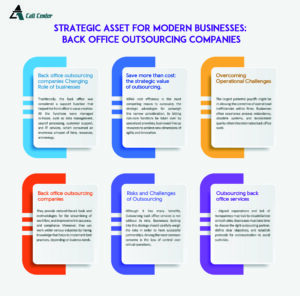In most organizations, managing core competencies along with having control over operational challenges creates an even balance. This is where the role of back office outsourcing companies comes into effective play as a strategic business partner in efforts to do more with less. The role of outsourcing back office services has come of age and now constitutes not just a cost-saving measure but a complete strategy to restructure business.
Back office outsourcing companies Changing Role of businesses
Traditionally, the back office was considered a support function that helped the front office in value creation. All the functions were managed in-house, such as data management, payroll processing, customer support, and IT services, which consumed an enormous amount of time, resources, and energy. However, with the growing complexity and globalization of businesses, managing such functions in-house began to strain the resources and distract from strategic objectives.
So, back office outsourcing companies appeared as an expertise solution, along with scalable capacities, specialized in managing all of these vital but lengthy activities and putting the possibility to free the capacity of innovating and growth. So nowadays, outsourced back-office services no longer mean simply cost-cutting; today it means one’s winning position based on specialized abilities, innovative use of the latest technology, and worldwide availability.
Save more than cost: the strategic value of outsourcing
While cost efficiency is the most compelling reason to outsource, the strategic advantages far outweigh this narrow consideration. By letting non-core functions be taken over by specialized providers, businesses free up resources to achieve new dimensions of agility and innovation. Back office services are outsourced to access talent pools and advanced technologies that would be too expensive to build inside. This model supports scalability, allowing businesses to adapt their operations based on market demands.
For example, a business that experiences seasonal fluctuations in customer demand may face staffing and operational inefficiencies at peak times. Outsourcing back office services such as customer service or data entry allows businesses to scale their operations flexibly without recruitment, training, or infrastructure investment challenges. This agility can be critical in industries where responsiveness determines success.
Overcoming Operational Challenges
The largest potential payoffs might be in allowing the correction of operational inefficiencies within firms. Businesses often experience process redundancy, obsolete systems, and inconsistent quality when they internalize back office work. Such inefficiencies not only cost more but sometimes enable customers to miss opportunities in that business.
Back office outsourcing companies are optimized. They provide state-of-the-art tools and methodologies for the streamlining of workflow, and improvement in accuracy, and compliance. Moreover, they can work within various industries by having knowledge that helps to implement best practices, depending on business needs.
For instance, when complying with regulatory standards in areas such as healthcare or finance, it is a pain to follow through. A good outsourcing firm in such a case means ensuring that all regulatory affairs have been taken care of hence reducing the risk of penalty errors. Finally, an outsourcing back office like the data entry and analysis can improve decision-making by giving improved integrity and availability of the information for use.
Conclusion
Back office outsourcing companies have moved from being service providers. They are now the main agents of change and growth. Outsourcing services allow businesses to focus more on their core competencies as they reap the advantage of specialized expertise, advanced technologies, and operational flexibility, thereby realizing the full benefits of their arrangements. To achieve that end, businesses must no longer treat outsourcing as just an arrangement but as a strategic decision. Hence, to get maximum benefit from outsourcing, firms should pick those partners with a probability of having successful partnerships.


